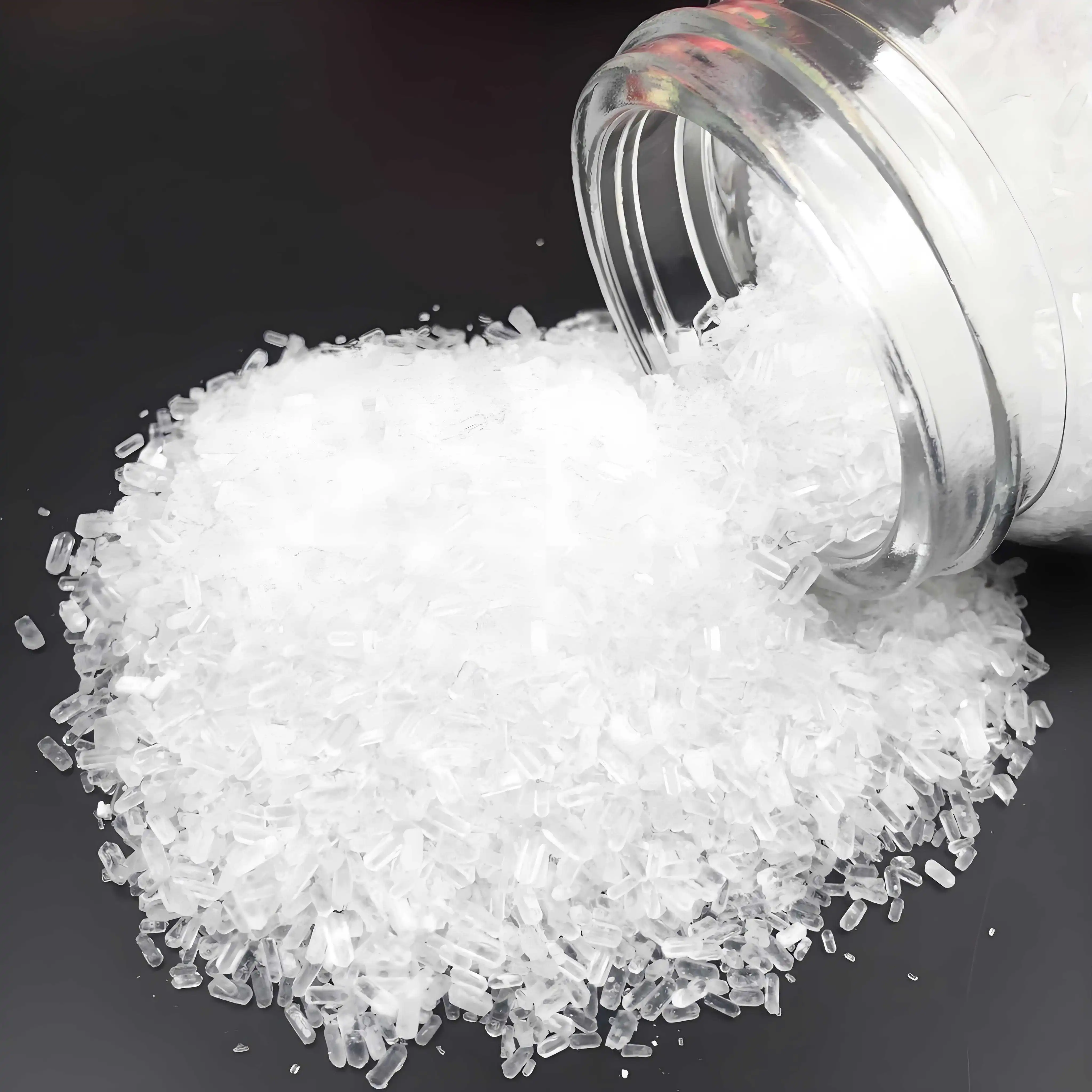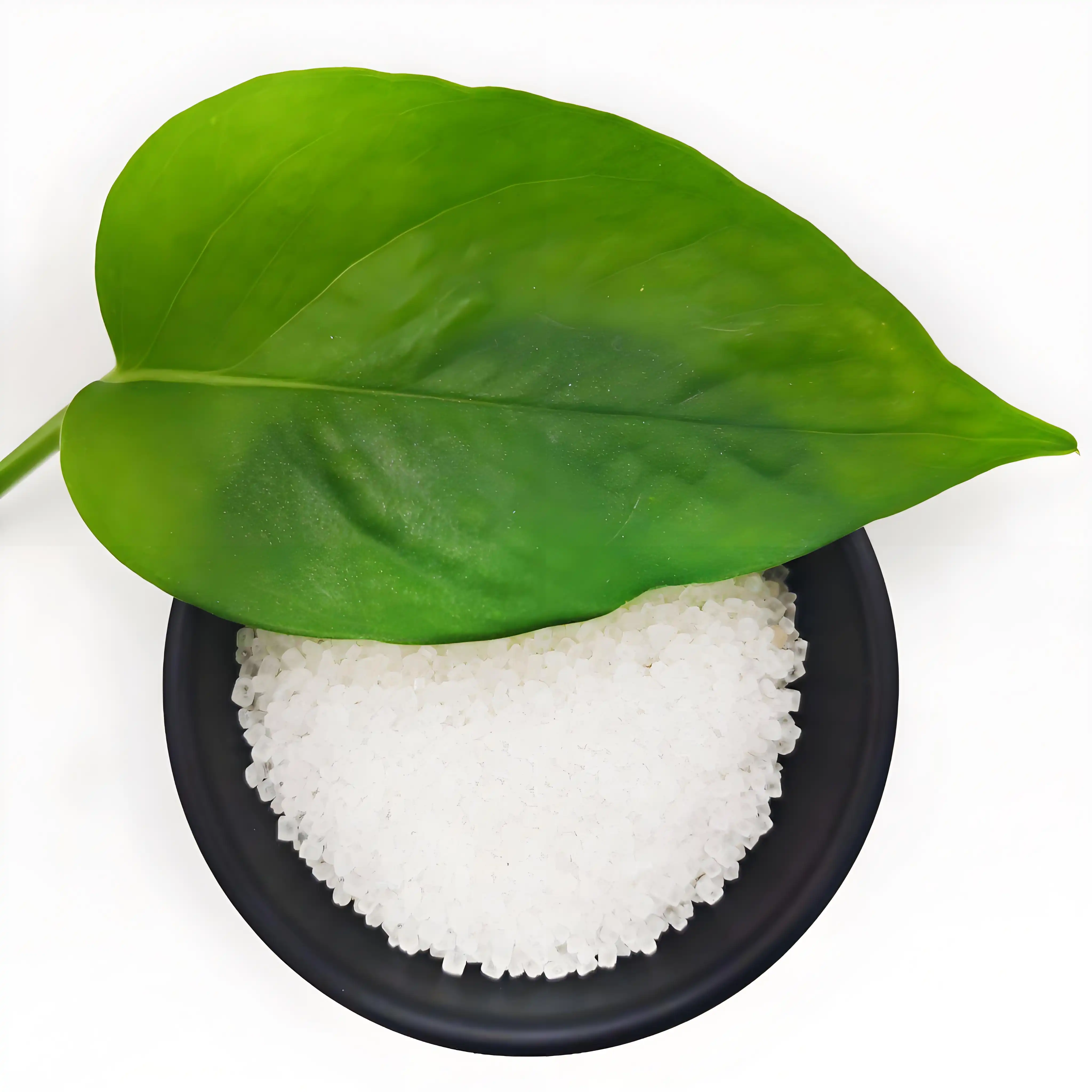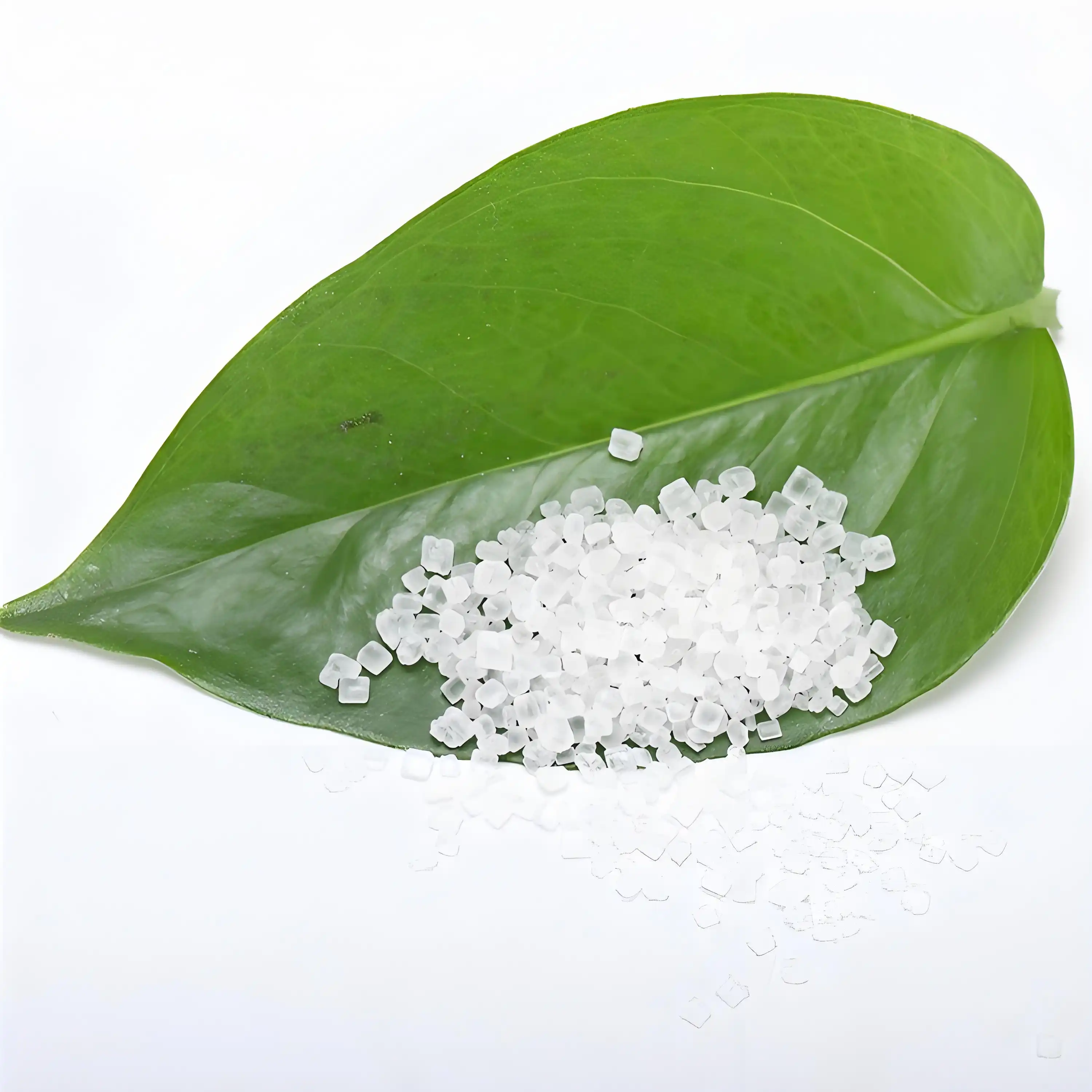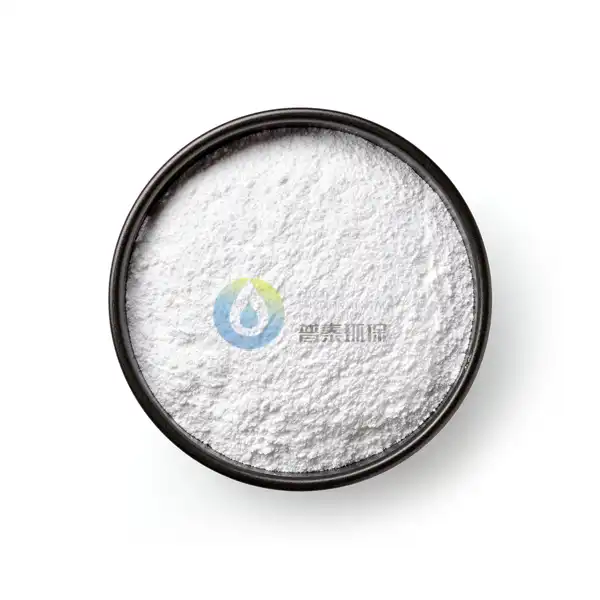What is the role of sulfur in Potassium Sulfate Fertilizer 0-0-53?
Potassium Sulfate Fertilizer 0-0-53 is a popular choice among farmers and gardeners for its high potassium content and the added benefits of sulfur. While the primary focus is often on potassium, the role of sulfur in this fertilizer is equally important. This blog post will explore the significance of sulfur in Potassium Sulfate Fertilizer 0-0-53 and how it contributes to plant growth and development.
How does sulfur affect plant growth in Potassium Sulfate Fertilizer 0-0-53?
Sulfur's role in protein synthesis
Sulfur plays a crucial role in protein synthesis within plants, which is essential for their growth and development. In Potassium Sulfate Fertilizer 0-0-53, the sulfur component works in conjunction with potassium to promote the formation of amino acids, the building blocks of proteins. These proteins are vital for various plant functions, including enzyme production, chlorophyll formation, and overall plant structure. By providing readily available sulfur, Potassium Sulfate Fertilizer 0-0-53 ensures that plants can efficiently synthesize the proteins necessary for healthy growth and optimal yield.
Sulfur's impact on chlorophyll production
Another significant role of sulfur in Potassium Sulfate Fertilizer 0-0-53 is its involvement in chlorophyll production. Chlorophyll is the pigment responsible for the green color in plants and is essential for photosynthesis. Sulfur is a key component of chlorophyll molecules, and its presence in the fertilizer helps plants maintain healthy foliage and efficient photosynthetic processes. By promoting chlorophyll production, the sulfur in Potassium Sulfate Fertilizer 0-0-53 enhances the plant's ability to convert light energy into chemical energy, leading to improved growth rates and overall plant health.
Sulfur's contribution to disease resistance
The sulfur content in Potassium Sulfate Fertilizer 0-0-53 also plays a role in enhancing plant disease resistance. Sulfur is involved in the production of certain compounds that help plants defend themselves against pathogens and pests. These include sulfur-containing amino acids and various secondary metabolites that act as natural pesticides. By providing an adequate supply of sulfur, Potassium Sulfate Fertilizer 0-0-53 helps plants build stronger natural defenses, reducing the need for chemical pesticides and promoting healthier, more resilient crops.
What are the benefits of using Potassium Sulfate Fertilizer 0-0-53 compared to other fertilizers?
Higher potassium content
One of the primary advantages of using Potassium Sulfate Fertilizer 0-0-53 is its high potassium content. With 53% potassium by weight, this fertilizer provides a concentrated source of this essential nutrient. Potassium plays a vital role in various plant functions, including water regulation, nutrient uptake, and photosynthesis. The high potassium concentration in Potassium Sulfate Fertilizer 0-0-53 makes it an efficient choice for crops with high potassium requirements or for soils deficient in this nutrient. This can lead to improved crop quality, increased yield, and better overall plant health.
Chloride-free formulation
Another significant benefit of Potassium Sulfate Fertilizer 0-0-53 is its chloride-free formulation. Many potassium fertilizers contain chloride, which can be detrimental to certain crops or in soils with high salinity. The sulfate form of potassium in this fertilizer provides a safe alternative for chloride-sensitive crops such as tobacco, potatoes, and various fruits. By using Potassium Sulfate Fertilizer 0-0-53, farmers can avoid the potential negative effects of chloride accumulation in the soil while still providing their crops with the necessary potassium and sulfur nutrients.
Improved soil structure
The use of Potassium Sulfate Fertilizer 0-0-53 can also contribute to improved soil structure. The sulfate component of the fertilizer can help reduce soil compaction and improve water infiltration. This is particularly beneficial in heavy clay soils or areas with poor drainage. By enhancing soil structure, Potassium Sulfate Fertilizer 0-0-53 promotes better root development and nutrient uptake, leading to healthier plants and increased crop yields. Additionally, the improved soil structure can help reduce erosion and increase the soil's water-holding capacity, which is especially valuable in areas prone to drought or water scarcity.
How does the sulfur content in Potassium Sulfate Fertilizer 0-0-53 affect soil pH?
Soil acidification process
The sulfur content in Potassium Sulfate Fertilizer 0-0-53 can have an impact on soil pH, primarily through the process of soil acidification. When applied to the soil, the sulfate component of the fertilizer undergoes various chemical reactions. These reactions can lead to the production of sulfuric acid, which, in turn, can lower the soil pH. However, it's important to note that the acidification effect of Potassium Sulfate Fertilizer 0-0-53 is generally milder compared to other sulfur-containing fertilizers, such as ammonium sulfate. This makes it a suitable choice for a wide range of soil types and pH levels, while still providing the benefits of both potassium and sulfur nutrients.
pH management in alkaline soils
In alkaline soils, the mild acidifying effect of Potassium Sulfate Fertilizer 0-0-53 can be particularly beneficial. Many essential nutrients become less available to plants in high pH soils, and the gradual lowering of soil pH through the use of this fertilizer can help improve nutrient availability. This is especially true for micronutrients such as iron, manganese, and zinc, which tend to be less soluble in alkaline conditions. By using Potassium Sulfate Fertilizer 0-0-53 in alkaline soils, farmers can simultaneously address potassium and sulfur deficiencies while also improving overall nutrient availability through pH management.
Long-term effects on soil chemistry
The long-term use of Potassium Sulfate Fertilizer 0-0-53 can have lasting effects on soil chemistry. While the immediate impact on soil pH may be relatively small, consistent application over multiple growing seasons can lead to cumulative changes in soil acidity. This gradual change allows plants and soil microorganisms to adapt to the shifting pH levels, minimizing potential stress on the ecosystem. Additionally, the sulfur component of the fertilizer can contribute to the formation of organic matter in the soil, further influencing soil chemistry and structure over time. It's important for farmers to monitor soil pH regularly and adjust their fertilization practices accordingly to maintain optimal growing conditions for their crops.
Conclusion
In conclusion, the role of sulfur in Potassium Sulfate Fertilizer 0-0-53 is multifaceted and integral to its effectiveness as a plant nutrient. Sulfur contributes to protein synthesis, chlorophyll production, and disease resistance in plants, working synergistically with potassium to promote overall plant health and productivity. The benefits of using this fertilizer include its high potassium content, chloride-free formulation, and positive effects on soil structure. Additionally, the sulfur content's impact on soil pH can be advantageous, particularly in alkaline soils. Understanding these aspects can help farmers and gardeners make informed decisions about their fertilization strategies, ultimately leading to improved crop yields and quality.
Xi'an Putai Environmental Protection Co., Ltd. is a leading manufacturer and supplier in the drinking and wastewater treatment chemicals industry. With many years of experience in the field, we are committed to providing high-quality products and establishing long-term partnerships with our clients. Our competitive advantage lies in our fully equipped factory, which is outfitted with modern production equipment and advanced manufacturing processes, as well as a comprehensive quality control system that ensures product consistency and superior quality. Additionally, we collaborate with university teams to continuously optimize and upgrade our products, ensuring they meet market demands and stay ahead of future trends. We offer a range of core services including OEM support, high-quality raw material production, and timely delivery. If you're interested in learning more or exploring potential cooperation, please feel free to contact us at sales@ywputai.com. We look forward to the opportunity to work with you.
References
1. Smith, J. A., & Johnson, B. C. (2019). The Role of Sulfur in Plant Nutrition: A Comprehensive Review. Journal of Plant Sciences, 45(3), 234-251.
2. Brown, R. D., et al. (2020). Potassium Sulfate Fertilizer: Effects on Crop Yield and Quality. Agricultural Research Quarterly, 62(2), 112-128.
3. García-López, M., & Rodríguez-Fernández, A. (2018). Sulfur Metabolism in Plants: From Uptake to Assimilation. Annual Review of Plant Biology, 69, 301-325.
4. Thompson, L. K., & Wilson, P. E. (2021). Soil pH Management Using Sulfur-Containing Fertilizers. Soil Science and Plant Nutrition, 57(4), 489-502.
5. Anderson, C. M., et al. (2017). Comparative Study of Potassium Fertilizers: Sulfate vs. Chloride Forms. Journal of Soil Fertility, 38(1), 78-93.
6. Zhang, Y., & Liu, X. (2022). Long-term Effects of Potassium Sulfate Fertilization on Soil Chemistry and Microbial Communities. Environmental Science and Pollution Research, 29(8), 11567-11580.
RECOMMENDATIONS
 VIEW MOREWholesale Ammonium Sulfate Fertilizer 21-0-0
VIEW MOREWholesale Ammonium Sulfate Fertilizer 21-0-0 VIEW MOREHigh Purity Ammonium Sulfate Fertilizer
VIEW MOREHigh Purity Ammonium Sulfate Fertilizer VIEW MORECaprolactam-Grade Ammonium Sulfate Fertilizer
VIEW MORECaprolactam-Grade Ammonium Sulfate Fertilizer_1729216561998.webp) VIEW MORESop Water Soluble Fertilizer
VIEW MORESop Water Soluble Fertilizer_1729216311056.webp) VIEW MOREPotassium Magnesium Sulfate Fertilizer
VIEW MOREPotassium Magnesium Sulfate Fertilizer_1729215837243.webp) VIEW MOREPotassium Sulfate Organic Fertilizer
VIEW MOREPotassium Sulfate Organic Fertilizer_1729215772183.webp) VIEW MOREPotassium Sulfate Fertilizer 0-0-53
VIEW MOREPotassium Sulfate Fertilizer 0-0-53 VIEW MOREOrganic Potassium Sulfate Fertilizer
VIEW MOREOrganic Potassium Sulfate Fertilizer_1729233544024.webp) VIEW MORESolid Potassium Sulfate Fertilizer
VIEW MORESolid Potassium Sulfate Fertilizer_1729215651315.webp) VIEW MOREFertilizer Potassium Sulfate
VIEW MOREFertilizer Potassium Sulfate_1729215530587.webp) VIEW MORESop Fertilizer
VIEW MORESop Fertilizer

